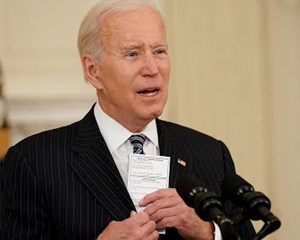JUDY WOODRUFF: And we explore some of the politics of the president's infrastructure plan now with our Yamiche Alcindor at the White House. So, hello, Yamiche. We know that President Biden, one of the things he said he was going to do with this infrastructure plan was include efforts to promote racial equity. How exactly does he do that?
YAMICHE ALCINDOR: Well, President Biden has said he wants to make racial equity a central part of his infrastructure plan. And to do that, he's investing billions and billions of dollars on initiatives to impact specifically Black communities and communities of color. When you walk through the plan, you see a number of things that are targeting community that have historically had issues, that have historically been targeted and have had some troubles. I want to walk you through some of what's in that plan; $400 billion is dedicated to in-home care for disabled and older Americans. The White House says this is going to raise wages of those working in those homes and who are predominantly low-paid women, often women of color. There's $100 billion to expand broadband. The White House said this will disproportionately help Black and Latino families, who have less access to affordable broadband than white families. There's $45 billion to eliminate all lead pipes and service lines in our drinking water systems. That, the White House says, will impact children, and specifically children of color. And then there's $20 billion to invest in communities historically hurt by infrastructure plans. That's communities, African American communities in places like New Orleans, in Syracuse, that in the past had highways and other infrastructure plans built through their neighborhoods that were then -- that then led to Black-owned businesses and playgrounds and all sorts of sort of economic hurt to those neighborhoods. So, those are just some of the things that the plan is doing specifically targeted to communities of color.

JUDY WOODRUFF: And, Yamiche, how does the president make the case that racial justice is part of infrastructure?
YAMICHE ALCINDOR: Well, all of this, Judy, President Trump -- all of this, Judy, President Biden says, is really targeted at racial equality. He says the access to clean water, lead pipes being eliminated, he says the ability to have a living wage, as well as having access to broadband, which, of course, is key in a society now that is relying more and more on Internet, all of this is really about how people survive and thrive in America. He says that has to be part of what we consider to be infrastructure. He said the idea of infrastructure has been evolving for generations. And he said this should be another generation that evolves that. He says, part of this really is about making sure that families can have a new generation of Americans who can look at their lives and say there is dignity to work, there is living wage, there's a way to survive in this country. I pressed the White House on that. They also said that this is a jobs plan, that we should be thinking about it not just as infrastructure, but as really how we're impacting people's lives across the country related not just to infrastructure, but to the way that they can survive.
JUDY WOODRUFF: So many parts to this complex -- big and complex infrastructure plan that the president has proposed, and we're trying to look at each part of it. Yamiche Alcindor, thank you.
YAMICHE ALCINDOR: Thanks so much.












